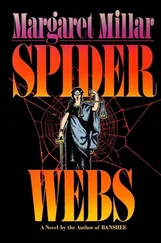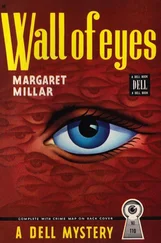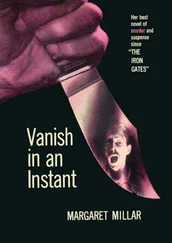Маргарет Миллар - Do Evil In Return
Здесь есть возможность читать онлайн «Маргарет Миллар - Do Evil In Return» весь текст электронной книги совершенно бесплатно (целиком полную версию без сокращений). В некоторых случаях можно слушать аудио, скачать через торрент в формате fb2 и присутствует краткое содержание. Город: New York, Год выпуска: 1950, Издательство: Random House, Жанр: thriller_psychology, на английском языке. Описание произведения, (предисловие) а так же отзывы посетителей доступны на портале библиотеки ЛибКат.
- Название:Do Evil In Return
- Автор:
- Издательство:Random House
- Жанр:
- Год:1950
- Город:New York
- ISBN:нет данных
- Рейтинг книги:5 / 5. Голосов: 1
-
Избранное:Добавить в избранное
- Отзывы:
-
Ваша оценка:
- 100
- 1
- 2
- 3
- 4
- 5
Do Evil In Return: краткое содержание, описание и аннотация
Предлагаем к чтению аннотацию, описание, краткое содержание или предисловие (зависит от того, что написал сам автор книги «Do Evil In Return»). Если вы не нашли необходимую информацию о книге — напишите в комментариях, мы постараемся отыскать её.
Do Evil In Return — читать онлайн бесплатно полную книгу (весь текст) целиком
Ниже представлен текст книги, разбитый по страницам. Система сохранения места последней прочитанной страницы, позволяет с удобством читать онлайн бесплатно книгу «Do Evil In Return», без необходимости каждый раз заново искать на чём Вы остановились. Поставьте закладку, и сможете в любой момент перейти на страницу, на которой закончили чтение.
Интервал:
Закладка:
She gave up the attempt at Eureka where she had to stop for gas and for lunch. She ate at a hamburger stand. She was amazed at herself for trying to overtake Easter, and at all the other rather childish things she’d said and done since she met him. The poise, the self-control, that she’d cultivated for years seemed to slip away when she was with Easter, leaving her as gauche as a high-school girl, quick to blush, quick to be angered or take offense.
If I can’t catch up with him, Charlotte thought, I will lag away behind. I will make him wonder what’s happened to me. No, no, that’s absurd. I mustn’t even think of such a thing. I must be myself, not this half-aggressive, half-coy female. I will drive home in the ordinary way, as if Easter didn’t exist. I should be home by five.
It was nearly eight when she turned into her driveway.
In the headlights of the car the overhead door of the double garage loomed, a blank wall of white. The door was closed, and she’d left it open. Fear alerted her senses, quickened her imagination. The night wind, which only a moment ago had felt fresh against her skin, now seemed to have a treacherous softness about it. A laughing bird taunted her from his perch on a telephone wire.
She had left the garage door open and now it was closed. It was puzzling, but there was no reason to be afraid. She tried to convince herself that anyone could have closed it — Lewis, Miss Schiller, the postman, a child playing in the neighborhood, perhaps even Easter, trying to startle her as he’d startled her when he stepped from behind the tree at Sullivan’s — but common sense told her that none of these was a real possibility. Easter was no cruel practical joker and neither Lewis nor Miss Schiller had any reason to come here, knowing she was away. The child, the postman — she had thought of them only because she wanted quite desperately to believe that the closed door meant nothing, held no secrets.
She left the headlights on. As she walked towards the garage she remembered Easter’s picture of Violet’s face lathered with death-foam. But the sea is far away, she thought, not even visible at night like this; and I can swim. I can swim a mile if I have to.
It was the first time since she’d become involved in the case that she was afraid of physical violence directed against herself. Her vague diffuse fears (of Easter, of the old house on Olive Street) had synthesized into something so tight and compact it could fit on the point of a needle and pierce her spine.
The door was unlocked and, she saw now, not even fully closed. There were three or four inches of space at the bottom, as if someone in urgent haste had slammed the door down and it had bounced up a little and stuck there.
She had to strain to open it, breathing hard, her whole body tensed, braced against attack. But there was no attack, no one in the garage at all. Only a car, parked on the right side where Lewis always parked his — a small convertible with the top up.
She turned on the ceiling light and walked over to the front of the convertible. It was a blue Ford. She had seen many of them on the streets, but she didn’t know anyone who owned one and she could think of no reason for the car to be parked in her garage. It had been driven at high speed — gray and yellow blobs of insects splattered the windshield and the headlights and a small dead bird was caught in the chromium grillwork. She felt the hood of the engine with her hand; it was cold. The car had been standing there for some time.
A Ford convertible, the kind of car Eddie was said to have bought. But Voss and Eddie were miles away by this time, perhaps already out of the country, as they had planned. “It’s better climes for Eddie and me.”
She got into the front seat and turned on the dashboard fights. The ignition key was gone; the car had been left there to stay in her garage. There was no way of getting rid of it except to push it upgrade by herself, which was impossible, or to call the Auto Club for a tow truck.
She turned sideways to step out of the car and a glint of metal on the back seat caught her eye. She leaned over the edge of the seat and saw that Voss and Eddie had reached their better climes.
They were curled up on the floor like a pair of lovers in a fatal embrace. Voss’s head was buried against Eddie’s chest; there was nothing to show how he had died. But Eddie’s face was upturned, pinned against the door, and on his forehead two neat dark holes had been bored. Death had come to him more easily than to Violet. He looked peacefully asleep except for the extra eyes on his fore head.
On the seat lay an ordinary jackknife with the large blade pulled out, a knife like the one Eddie had used the previous night. He’d taken it out of his vest pocket, and flipped the blade open and cleaned his fingernails while Voss was talking. The knife lay now on the back seat of the car, a childish, impotent weapon of defense against the swift certainty of a gun. Eddie had had no chance to use the knife; its blade was unstained, gleaming blandly in the light of the garage.
She stumbled out of the car, half paralyzed, not by the shock of seeing wo dead bodies, but by the realization that there was no way now that she could get rid of the car and he bodies. They were hers, they were hanging from her neck like the mariner’s albatross. A scream died in her throat.
Outside, the bird was still laughing at her from the telephone wire.
18
A car passed on the road, not speeding as cars usually did on Mountain Drive at night, but groping along, as if the driver was searching for a certain house, a certain person. The car paused, reversed gear, and braked to a stop outside her house.
She ran out of the garage and pulled down the door just as Easter stepped through the wooden gate into the yard. He didn’t speak for a minute. His eyes traveled from her face to the Buick with the headlights still on, to the closed door of the garage.
“I’ll open the garage for you,” he said.
“No.” She made a convulsive movement of protest that stiffened her whole body, like an electric shock. “No, thanks.”
“All right, do it yourself.” He added something under his breath that sounded like “damn emancipated females.”
“I... I’d prefer to leave the car out.” Her voice was unnatural, high and tight, as if hands were squeezing her larynx. “I never know when I’ll have to make a call.”
“Blake’s taking your calls.”
“Stop arguing with me. I’m — tired. If you don’t mind, I wish you’d go away.”
“You’re always wishing I’d go away. It’s painful to me. Easter, Easter, go away, don’t come again some other...”
“Please. I really am tired.”
“I know. I won’t keep you. I came to see whether you got home all right.”
“Well, I did. I did, You can see that.”
“I can see a lot of things,” he said slowly. “You’re nervous as hell. What’s up?”
“Nothing. You... you didn’t really come here to see if I arrived safely. You’re spying on me.”
“Why should I?”
“Because you think that I’m mixed up in all these terrible things.”
“They’re not so terrible — a suicide, a natural death — no murder.” He repeated, “No murder,” in an insinuating tone as if he expected her to contradict him. She said nothing.
He walked over to her car, turned off the headlights and removed the key ring from the ignition. He tossed it to her. It fell in the grass at her feet and she watched it dully, as if her mind were too dazed to understand the concept of catching something that was thrown at her.
“Your keys,” Easter said.
“Keys? Oh. Yes, of course.”
They knelt, simultaneously, to pick up the key ring and their arms touched. She drew back as if he’d aimed a blow at her.
Читать дальшеИнтервал:
Закладка:
Похожие книги на «Do Evil In Return»
Представляем Вашему вниманию похожие книги на «Do Evil In Return» списком для выбора. Мы отобрали схожую по названию и смыслу литературу в надежде предоставить читателям больше вариантов отыскать новые, интересные, ещё непрочитанные произведения.
Обсуждение, отзывы о книге «Do Evil In Return» и просто собственные мнения читателей. Оставьте ваши комментарии, напишите, что Вы думаете о произведении, его смысле или главных героях. Укажите что конкретно понравилось, а что нет, и почему Вы так считаете.
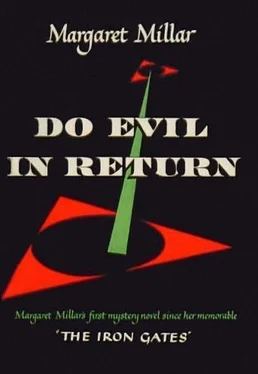

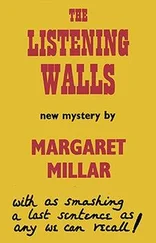
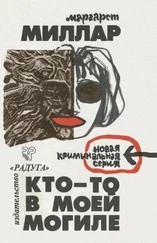
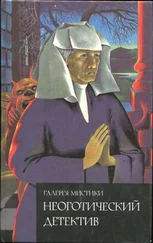
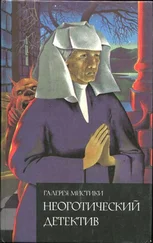

![Маргарет Миллар - Rose's Last Summer [= The Lively Corpse]](/books/384369/margaret-millar-rose-s-last-summer-the-lively-c-thumb.webp)
